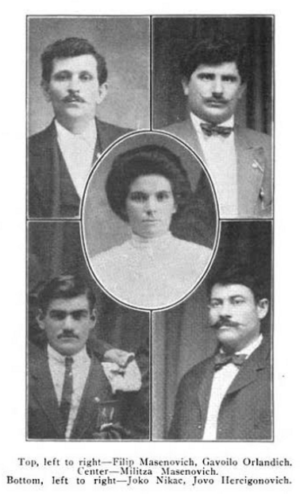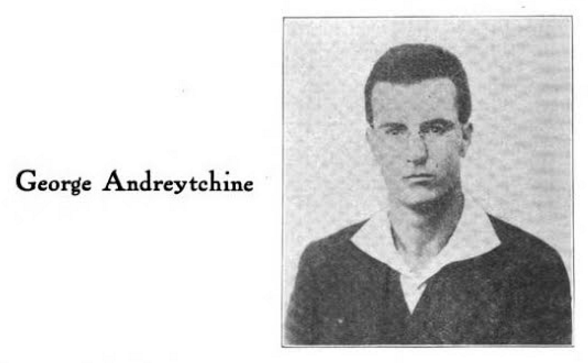There are no limits to which
powers of privilege will not go
to keep the workers in slavery.
-Mother Jones
Hellraisers Journal: Friday September 8, 1916
From the International Socialist Review: Minnesota Justice
The Masonovich Case
INVADING MINERS’ HOMES
By OTTO CHRISTENSEN
ON the afternoon of July 3rd mine guard Nick Dillon, in company with three guards, invaded the home of Phillip Mesomovich [Masonovich]. Now Dillon, who led the guards, has served as a mine guard for several years both in Minnesota and Colorado. He has also served as a strong arm man identified with the assignation house in the neighborhood of Virginia, Minnesota. The notorious Dillon is known to most of the people on the range, and he was the only mine guard of the four that was known to any of the Mesomovich family.
When the guards entered the house Mrs. Mesomovich offered them chairs to sit down, but Nick Dillon replied that they had not come to sit down, but came to take Phillip Mesomovich and Joe Hercigonovich to jail. Mrs. Mesomovich replied to Dillon, “You fellows will not take my husband to jail before Old Man O’Hara comes from Biwabik.” O’Hara was the village marshal of Biwabik and the Mesomovich family lived at the Chicago location, which is within the village limits of Biwabik. Mrs. Mesomovich’s husband was asleep at the time, but came out of the bedroom shortly after the guards had entered the home. Mesomovich asked for his shoes and Mrs. Mesomovich started toward the bedroom when Dillon assaulted her. Mrs. Mesomovich told her story as follows:
Dillon was standing near door to bedroom and I went to bedroom to get Phillip’s shoes and Nick he says, “Ope,” and I says, “What ope means. I am going to get shoes for my husband.” Then Nick Dillon he got hold of me and threw me into the bedroom onto my baby. If the boy had not happened to be there I would have killed the baby. I spit blood for three days after that. I told Nick to get out of the house and I chased him out. I went outside after Nick and one of those fellows with him hit me over the head with club. Then all the fellows in the house started to hit Phillip and the boarders with the clubs. Nick he started to shoot from the yard.
One of the guards by the name of Schubisky, when testifying before Judge Smallwood, admitted that he fired several shots and that he fired them in the house, but no bullets or bullet holes were to be found in the house. Mine Guard Myron, who was killed, was standing in the doorway beating Orlandich, one of the boarders, and the three wild shots fired by Mine Guard Schubisky took effect in the back of Myron. The strikers had no revolvers and fired no shots. All the shooting was done by the mine guards.
The four Montenegrian strikers, Phillip Mesomovich, Joe Hercigonovich, John Orlandich and Joe Nikich, are now in the Duluth jail charged with the responsibility of Mine Guard Myron’s death. Following the arrests of these strikers, the organizers and men in charge of the strike, who at the time of the invasion of the Mesomovich home were many miles away, were arrested and charged with the murder of Mine Guard Myron on the theory that by their speeches they indirectly had encouraged and induced the affray that resulted in Myron’s death.
The basis for holding Tresca, Scarlett, Schmidt, Ahlgren and Wassaman is that they told the men in their speeches what their legal rights were in defense of their home. The crime of the strike leaders was to tell the men to put their hands in their pockets and keep them there and not to take them out until the strike was won, save in case of being attacked, assaulted or maltreated, and then only to use them in defense of their person, family and home. This advice that is attributed to have been given to the strikers forms the prosecutor’s inference that a conspiracy existed to resist mine guards and that this advice was the important influence that induced the Montenegrian strikers to resist Nick Dillon’s detachment of mine guards.
Placing the strike leaders on trial for murder was simply an effort to eliminate their influence and activities in the strike. It is a repetition of the old story of all the great industrial conflicts in this country, namely, the prostitution of public authorities to the whims, caprices and desires of “big business.” The men on trial are all in grave danger of having the severest penalty of the law imposed, regardless of the complete bankruptcy of the prosecutor’s case, whose only chance lies in getting a jury subservient to those in control of the industries. The demand of the steel trust is “Railroad the strike leaders.”
The effort to cripple the strike by arresting the leaders has failed in its immediate effect among the men only to solidify the ranks and make them more determined than ever to win the strike.
When the preliminary hearing of the strike leaders commenced before Judge Smallwood on July 21st, 1916, the striking miners gave testimonial to the confidence that they had in their leaders and expressed the sentiment and spirit of the men on strike. The striking miners crowded the court room, corridors and halls of the municipal court at Duluth, and when the men under arrest, led by Carlo Tresca entered the court room, the men started a demonstration which lasted until the army of court bailiffs cleared the court room.
The Andreytchine Case
CAN the Steel Corporation use the machinery of the United States Department of Labor to crucify, by deportation, a heroic young native of Bulgaria whose only crime has been to use his brains and courage on the side of the iron miners now on strike in Minnesota?
If George Andreytchine, disciple of Tolstoy, Thoreau and William Lloyd Garrison, is deported to Bulgaria, he will be shot for refusing to enter the army and fight for nationalist ideas which he long ago repudiated when a student in Sofia and Germany.
Within two weeks Andreytchine’s case will be settled. At the end of that time he will be deported to Bulgaria and almost certain execution, or forced to leave for South America, or turned back to the sheriff of Itasca county in Minnesota to stand trial for inciting to riot. Andreytchine is anxious to go back and fight the case trumped up against him on the testimony of the sheriff and the local head of the Steel Corporation’s police.
The Corporation chief of police testified that he never saw Andreytchine commit any act of violence, but that on the other hand he had prevented a clash between the strikers and company representatives, and that in public meetings he had advised the strikers to avoid going about in crowds and to keep away from the company gunmen. Andreytchine admits that he told the strikers, at public meetings, to strike back if the company guards insisted on attacking them without provocation.
Until the strike began this summer, Andreytchine, 22 years old, highly educated, and an office employe of the Steel Corporation at Hibbing, was a favorite of the company officials and their families because of his “interesting” views on the rights of labor and the sinfulness of force and violence. But when he joined the strikers and addressed their meetings, he became at once a dangerous alien. He was beaten up by a company chief of police, arrested by Sheriff Gunderson of Itasca county, and held in jail for inciting to riot. Then the U. S. immigration inspector at Duluth, Brown McDonald, was appealed to, and McDonald set to work to make a record that would procure the young man’s deportation.
In a flippant report to Washington. McDonald urged deportation on the ground that Andreytchine-
like old Man Tray, is in bad company for a pacificist. He is a dangerous man because he is smart, has acquired a knowledge of English within less than three years that is remarkable, and a vocabulary that many native borns do not possess. Also he is sincere.
Andreytchine has been in this country for two and one-half years. In another six months he would not be subject to deportation.
Frank P. Walsh, Mrs. J. Sergeant Cram, and many others have protested against the effort of the Steel Corporation to drive Andreytchine from the country. It is up to the labor movement and all other lovers of liberty in America to join in the protest against this attempt of the Steel Corporation to punish any man daring to revolt.
~~~~~~~~~~~~~~~~~~~~~~
SOURCE
The International Socialist Review, Volume 17
-ed by Algie Martin Simons, Charles H. Kerr
Charles H. Kerr & Company,
July 1916-June 1917
https://books.google.com/books?id=SVRIAAAAYAAJ
ISR, Sept 1916
https://books.google.com/books/reader?id=SVRIAAAAYAAJ&printsec=frontcover&output=reader&source=gbs_atb&pg=GBS.PA133
Invading Miners’ Homes by Otto Christensen
https://books.google.com/books/reader?id=SVRIAAAAYAAJ&printsec=frontcover&output=reader&source=gbs_atb&pg=GBS.PA161
George Andreytchine
https://books.google.com/books/reader?id=SVRIAAAAYAAJ&printsec=frontcover&output=reader&source=gbs_atb&pg=GBS.PA170
IMAGES
P & M Masonovich & Boarders, ISR, Sept 1916
https://books.google.com/books/reader?id=SVRIAAAAYAAJ&printsec=frontcover&output=reader&source=gbs_atb&pg=GBS.PA161
Andreytchine Article, ISR, Sept 1916
https://books.google.com/books/reader?id=SVRIAAAAYAAJ&printsec=frontcover&output=reader&source=gbs_atb&pg=GBS.PA170
I Am A Union Woman – Bobbie McGee
Lyrics by Aunt Molly Jackson
http://www.historyisaweapon.com/defcon1/unionwomanmollyjackson.html


